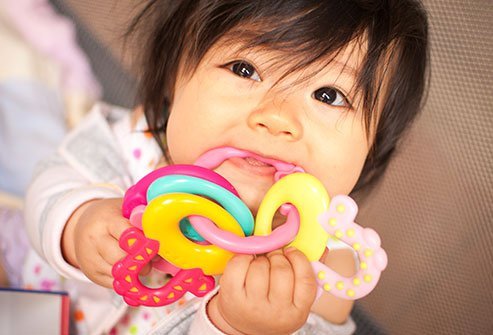Do Babies Get Sick When Teething?
Teething

Teething may cause slight discomfort in babies. However, if the child appears to be sick, fussy, or cranky for a longer time, it can be due to conditions other than teething.
Teething usually begins around four to eight months and continues until 30 to 36 months of age. Initially, the lower front teeth appear, and finally, the last set of molars appear. Some babies may experience the following symptoms during the teething period:
- Increased tendency to put things in their mouth
- Irritability or fussiness that comes and goes
- Disrupted sleep
- Swelling or inflammation of the gums
- Drooling
- Loss of appetite
- Rash around the mouth
- Mild temperature (never higher than 100 °F)
- Diarrhea
- Increased biting
- Gum-rubbing
- Ear-rubbing
- Is less interested in solids
- Chews on toys or other objects
- Brings hands to mouth
If your baby experiences these symptoms, do not blame it only on teething and delay treatment. The child could be sick and needs immediate medical intervention. Symptoms include
- Fever: If the fever reaches 101 °F, immediately contact the pediatrician because it could be a sign of infection.
- Diarrhea: If the stool becomes watery and persists for more than a day, it could be a sign of a more severe infection. Contact your child’s pediatrician if you observe watery stools.
- Prolonged fussiness: If your baby constantly cries to a point where they can’t be consoled or find it difficult to sleep, contact your pediatrician immediately.
- Rashes over the body: Rashes spreading across their torso, arms, or legs should be brought to your pediatrician’s attention.
- Runny nose: Runny nose that lasts for more than 10 days isn’t a sign of teething but for a sign of infection. You should immediately contact the pediatrician.
- Cough: If your baby has a continuous cough with a high fever and cold, it could be a sign of flu. You should contact your infant’s doctor immediately.
- Cheek rubbing and ear pulling: Please contact your doctor if your baby’s ear pulling or cheek rubbing persists or is accompanied by a high fever. It may indicate an ear infection.
These could be signs of an infection that may simultaneously occur with teething. It is necessary to consult a pediatrician if you find any unusual symptoms other than these symptoms.
Can teething lead to vomiting?
Teething can never cause vomiting. If your child experiences vomiting, watery stools, or fever, it may probably be due to a stomach infection.
Is teething associated with fever?
Teething doesn’t cause fever. A study of 2016 challenged the common belief that teething causes fever and other symptoms in infants. Many studies afterward concluded that teething causes a slight increase in temperature, but that temperature rise wasn’t a fever.
Temperature related to teething may range between 99 and 100 °F. A fever is a temperature of 100.4 °F or higher. Thus, a baby may have a slight temperature increase during teething rather than an actual fever. If the baby experiences fever, you should check if there are other causes.
